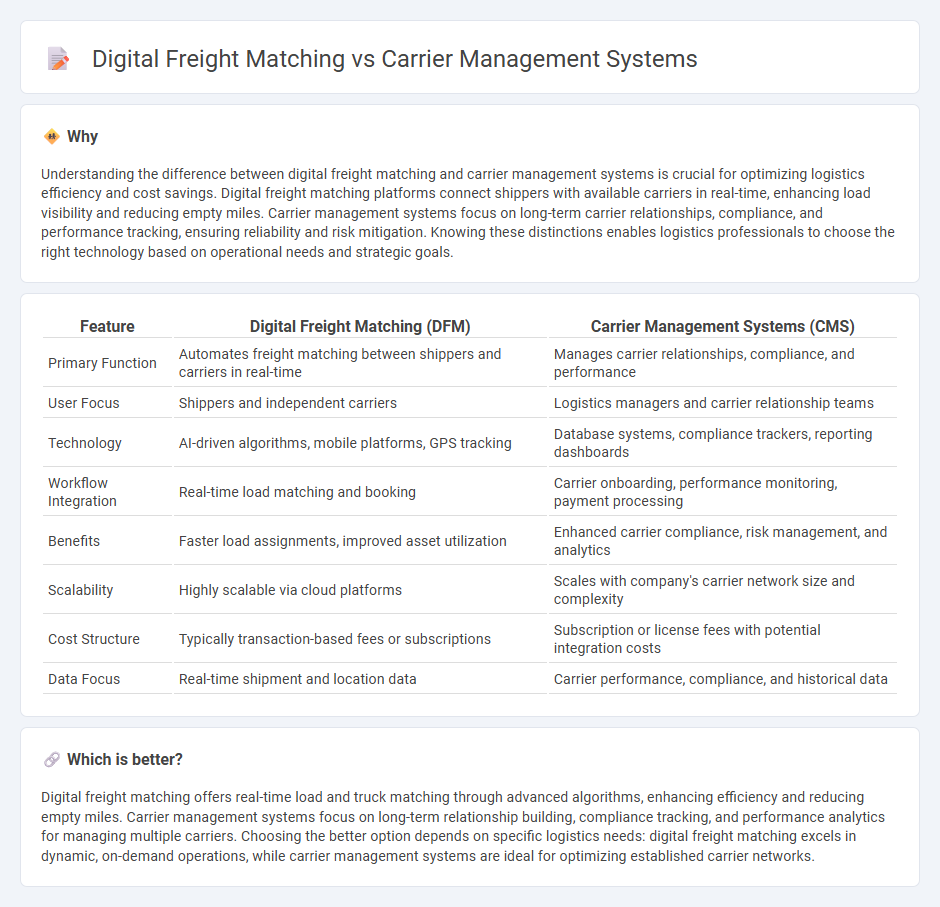
Digital freight matching platforms streamline the process of connecting shippers with available carriers using real-time data and algorithms, optimizing load assignments and reducing empty miles. Carrier management systems focus on maintaining long-term relationships and operational efficiency by managing carrier performance, compliance, and contract details. Explore how integrating digital freight matching with carrier management systems can transform logistics operations.
Why it is important
Understanding the difference between digital freight matching and carrier management systems is crucial for optimizing logistics efficiency and cost savings. Digital freight matching platforms connect shippers with available carriers in real-time, enhancing load visibility and reducing empty miles. Carrier management systems focus on long-term carrier relationships, compliance, and performance tracking, ensuring reliability and risk mitigation. Knowing these distinctions enables logistics professionals to choose the right technology based on operational needs and strategic goals.
Comparison Table
| Feature | Digital Freight Matching (DFM) | Carrier Management Systems (CMS) |
|---|---|---|
| Primary Function | Automates freight matching between shippers and carriers in real-time | Manages carrier relationships, compliance, and performance |
| User Focus | Shippers and independent carriers | Logistics managers and carrier relationship teams |
| Technology | AI-driven algorithms, mobile platforms, GPS tracking | Database systems, compliance trackers, reporting dashboards |
| Workflow Integration | Real-time load matching and booking | Carrier onboarding, performance monitoring, payment processing |
| Benefits | Faster load assignments, improved asset utilization | Enhanced carrier compliance, risk management, and analytics |
| Scalability | Highly scalable via cloud platforms | Scales with company's carrier network size and complexity |
| Cost Structure | Typically transaction-based fees or subscriptions | Subscription or license fees with potential integration costs |
| Data Focus | Real-time shipment and location data | Carrier performance, compliance, and historical data |
Which is better?
Digital freight matching offers real-time load and truck matching through advanced algorithms, enhancing efficiency and reducing empty miles. Carrier management systems focus on long-term relationship building, compliance tracking, and performance analytics for managing multiple carriers. Choosing the better option depends on specific logistics needs: digital freight matching excels in dynamic, on-demand operations, while carrier management systems are ideal for optimizing established carrier networks.
Connection
Digital freight matching platforms streamline carrier management systems by leveraging real-time data to optimize load assignments and enhance operational efficiency. Integration of these technologies allows logistics companies to automate carrier selection, track shipment statuses, and improve resource utilization. Advanced algorithms in digital freight matching tools directly feed into carrier management systems, facilitating seamless communication and reducing empty miles across transportation networks.
Key Terms
**Carrier Management Systems:**
Carrier Management Systems (CMS) streamline carrier onboarding, performance tracking, and compliance management, enhancing operational efficiency and reducing freight costs. These systems automate load assignments, optimize routes, and provide real-time visibility into carrier status, improving shipment reliability. Explore how Carrier Management Systems can transform logistics operations and boost supply chain agility.
Carrier Selection
Carrier management systems streamline carrier selection by providing comprehensive databases, performance metrics, and automated approval workflows, ensuring reliable and compliant carrier choices. Digital freight matching platforms utilize real-time data and algorithms to dynamically connect shippers with available carriers, optimizing load assignments based on proximity, capacity, and delivery windows. Explore how each technology transforms carrier selection to improve efficiency and reduce operational costs.
Contract Management
Carrier management systems streamline contract management by automating carrier onboarding, compliance tracking, and performance monitoring through centralized digital platforms. Digital freight matching enhances contract management by providing real-time carrier availability data, facilitating dynamic contract negotiations and instant freight assignment based on up-to-date capacity and rates. Explore how integrating these technologies can optimize your contract management processes and boost operational efficiency.
Source and External Links
50+ Carrier Management Software Examples - Wise Systems - Provides examples of carrier management software like Banyan, Blue Yonder, and Cargobase, highlighting features such as rate management, shipment tracking, and route optimization for enterprises and global shippers.
Carrier Management System: Why Use A CMS - HorizonGO - Explains that a carrier management system (CMS) is a software tool for managing transportation carrier relationships, carrier evaluations, deal and rate management, claims, and performance monitoring to optimize logistics operations.
10 Ways Carrier Management Software Helps You Save Money - Onfleet - Details how carrier management software improves logistics efficiency through real-time route optimization, centralized communication between stakeholders, and enhanced operational transparency for cost savings and better service.
 dowidth.com
dowidth.com